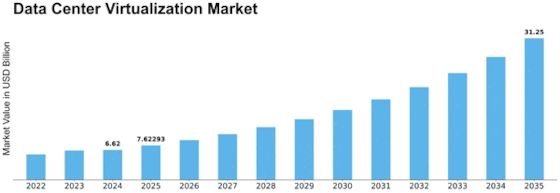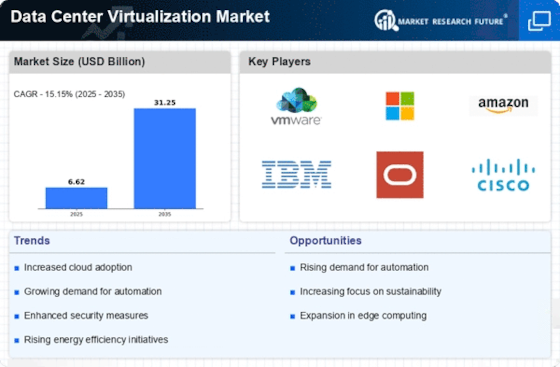Data Center Virtualization Size
Data Center Virtualization Market Growth Projections and Opportunities
In the rapidly evolving landscape of the Data Center Virtualization market, companies deploy various market share positioning strategies to navigate the complexities of IT infrastructure solutions. One fundamental strategy involves differentiation, where companies strive to set their Data Center Virtualization offerings apart from competitors by emphasizing unique features and capabilities. This may include advanced virtualization technologies, seamless integration with cloud services, or innovative approaches to resource management. By offering a differentiated value proposition, companies aim to attract enterprises seeking tailored virtualization solutions that can optimize their data center operations.
Cost leadership is a significant market positioning strategy within the Data Center Virtualization sector. Given the increasing demand for scalable and cost-effective IT solutions, companies focus on optimizing operational efficiencies, utilizing efficient hardware, and providing cost-effective virtualization platforms. By offering competitive pricing structures, companies target businesses looking for efficient data center virtualization without compromising on performance or scalability.
Innovation plays a pivotal role in market share positioning within the Data Center Virtualization market. As technology landscapes evolve, companies invest in research and development to introduce cutting-edge features and capabilities. This may involve advancements in containerization, integration of artificial intelligence for predictive resource management, or the development of tools for efficient workload migration. By staying at the forefront of innovation, companies not only cater to the current needs of enterprises but also position themselves as forward-thinking providers ready to address the challenges of future IT infrastructure requirements.
Strategic partnerships and collaborations are crucial components of market share positioning strategies in the Data Center Virtualization sector. Collaborations with hardware manufacturers, cloud service providers, or industry-specific partners can enhance the overall value proposition of virtualization solutions. Such partnerships enable companies to offer comprehensive and integrated solutions that address a broader range of IT needs. Additionally, alliances can provide access to new markets, expand customer bases, and create a collaborative ecosystem that drives continuous improvement in virtualization technologies.
Geographic focus is a nuanced approach to market positioning, particularly in the globalized Data Center Virtualization market. Some companies concentrate their efforts on specific regions where there is high demand for virtualization solutions or where they can establish a strong market presence. This targeted approach allows for a more localized marketing and sales strategy, taking into account regional business practices, regulatory landscapes, and market dynamics. Successfully navigating diverse global markets requires a deep understanding of local nuances and a flexible approach to cater to the varied needs of enterprises in different regions.
Security considerations are paramount in the Data Center Virtualization market, given the critical role virtualized infrastructure plays in managing sensitive data and applications. Companies invest heavily in robust security measures to ensure the confidentiality, integrity, and availability of their virtualization solutions. Addressing security concerns is not only a regulatory requirement but also a key factor in gaining the trust of enterprises relying on secure and compliant virtualized data center environments.




















Leave a Comment